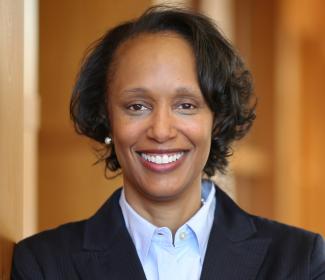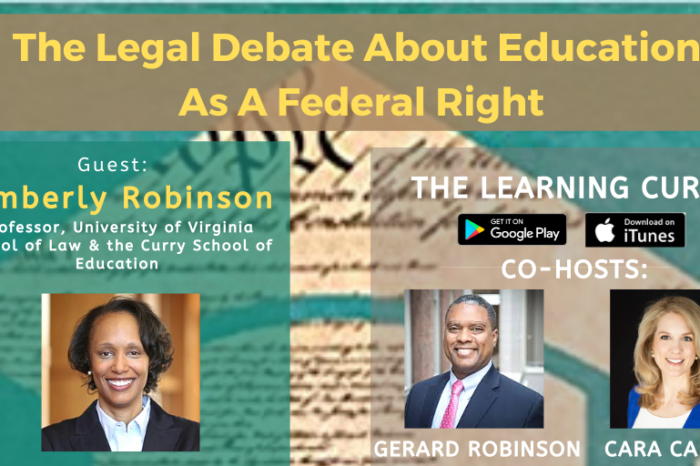UVA Law Professor Kimberly Robinson On Legal Debate About Education As Federal Right
This week on “The Learning Curve,” Cara and Gerard continue coverage of COVID-19’s impact on K-12 education, joined by Kimberly Robinson, Professor at the University of Virginia School of Law and the Curry School of Education. Kimberly discusses her new book, A Federal Right to Education: Fundamental Questions for Our Democracy, and the need for states to establish a “floor of opportunity” to ensure educational equity. She explores models of equity, including funding disparities, achievement gaps, and participation in democracy; and reviews the history of educational equity cases and the relative effectiveness of federal as opposed to state courts as an avenue of reform. She shares analysis of a recent United States Court of Appeals for the Sixth Circuit ruling that set a new precedent for its recognition of a right to a basic minimum education, under the U.S. Constitution, for Detroit students, after that school district was experiencing teacher shortages, out-of-date learning materials, and poor sanitary conditions. Lastly, she describes the inspiration for her work: her parents’ involvement in the Civil Rights movement, and the sacrifices they made for better educational opportunities.
Stories of the Week: New guidance from the U.S. Department of Education expanding federal aid through the CARES Act to private schools struggling to meet new pandemic-related challenges has drawn criticism from public school trade associations. American colleges and universities’ growing dependence on the increased revenue from international students, who pay larger tuitions than domestic students, has some concerned about the financial impact, especially in the COVID-19 era, on the ability to recruit skilled and talented applicants from abroad.
The next episode will air on May 15th, 2020 with guest, Kaya Henderson, the former chancellor of the District of Columbia Public Schools.
Newsmaker Interview Guest:
 Kimberly Robinson is the Elizabeth D. and Richard A. Merrill Professor of Law at the University of Virginia School of Law and Professor of Education, Curry School of Education. She is a national expert who speaks domestically and internationally about educational equity, equal educational opportunity, civil rights, and the federal role in education. In 2019, New York University Press published her second edited book, A Federal Right to Education: Fundamental Questions for Our Democracy. In 2015, Harvard Education Press published her book that was co-edited with Professor Charles Ogletree Jr. of Harvard Law School, titled The Enduring Legacy of Rodriguez: Creating New Pathways to Equal Educational Opportunity. Her scholarship has appeared in the University of Chicago Law Review, Boston College Law Review, William and Mary Law Review, and UC Davis Law Review, among other venues. Kimberly earned a B.A. from the University of Virginia and a J.D. from Harvard Law School.
Kimberly Robinson is the Elizabeth D. and Richard A. Merrill Professor of Law at the University of Virginia School of Law and Professor of Education, Curry School of Education. She is a national expert who speaks domestically and internationally about educational equity, equal educational opportunity, civil rights, and the federal role in education. In 2019, New York University Press published her second edited book, A Federal Right to Education: Fundamental Questions for Our Democracy. In 2015, Harvard Education Press published her book that was co-edited with Professor Charles Ogletree Jr. of Harvard Law School, titled The Enduring Legacy of Rodriguez: Creating New Pathways to Equal Educational Opportunity. Her scholarship has appeared in the University of Chicago Law Review, Boston College Law Review, William and Mary Law Review, and UC Davis Law Review, among other venues. Kimberly earned a B.A. from the University of Virginia and a J.D. from Harvard Law School.
Newslinks:
U.S. Universities Fear Losing International Students
https://www.governing.com/topics/education/gov-university-illinois-champaign-foreign-students.html
Guidance from DeVos means more coronavirus relief for private schools
https://www.chalkbeat.org/2020/5/5/21248179/equitable-services-coronavirus-private-schools
Tweet of the week:
Listen live: Supreme Court to stream oral arguments for first time as justices work remotely https://t.co/rkTFIOGmIp pic.twitter.com/Bbd8XamCtD
— CBS News (@CBSNews) May 4, 2020
Get Updates on Our Education Research
Related Content:















